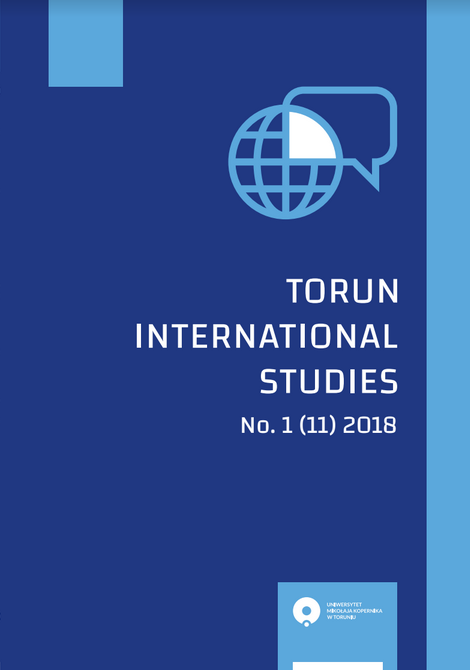RATIONALISTIC DIRECTION IN ANGLO-AMERICAN HISTORIOGRAPHY: BASIC APPROACHES TO THE STUDY OF GERMAN QUESTION IN POSTWAR DECADE
DOI:
https://doi.org/10.12775/TIS.2018.006Keywords
Anglo-American historiography, rationalistism, post-revisionism, German question, Cold War, postwar decadeAbstract
This article establishes the prerequisites and conditions for the formation of the rationalistic approach in Anglo-American historiography in the postwar period. The main aspects of the German problem, which became the subject of research in Anglo-American historiography, are identified, and the characteristic features and patterns of analysis of the the German problem in the works of rationalist historians are revealed. The aim of this article is to present a comprehensive analysis of the approaches of British and American rationalist historians to the study of the German question in the postwar decade. The research methodology includes principles of historicism and objectivity, as well as retrospective, geopolitical and axiological approaches. In conducting the study, logical (analysis and synthesis of the material) and special historical (historical-genetic, historical-comparative, historical-systemic) research methods were used. The results and conclusions of this article can be used in further study of the main trends in the development of historical science in the UK and the USA in the postwar period, as well as in analyzing the German problem in the system of international relations in the second half of the twentieth century.References
Berger, S. & LaPorte, N. (2015). Friendly enemies. Britain and the GDR, 1949–1990. New York: Berghahn.
Bitzer, R. (1969). Soviet policy on German reunification in 1952. World Affairs, Vol. 132, 3, 245-256.
Brady, S. (2004). The U.S. Congress and German–American relations. In: D. Junker (Ed.), The United States and Germany in the era of the cold war, 1945–1990, vol. 1 : 1945–1968 (pp. 133-140). Washington: German Historical Institute.
Calleo, D. (1978). The German problem reconsidered. Cambridge: Cambridge University Press.
Childs, D. (1983). The GDR: Moscow’s German ally. London: Allen&Unwinn.
Deighton, A. (2014). Germany and East-Central Europe, 1945–1990 : The view from London. In: M. Kramer, V. Smetana (Eds.), Imposing, maintaining and tearing open the iron curtain. The Cold War and East-Central Europe, 1945–1989 (pp. 211-227). New York: Lexington.
Dockrill, S. (1989). Britain and the settlement of the West German rearmament question in 1954. In: M. Dockrill, J.W. Young (Eds.), British foreign policy, 1945–56 (pp. 149-172). London: Macmillan.
Dockrill, S. (1992). Britain’s strategy for Europe: must West Germany be rearmed? 1949–51. In: R.J. Aldrich (Ed.), British intelligence, strategy and the cold war 1945–51 (pp. 193-214). London: Routledge.
Fulbrook, M. (2009). A history of Germany, 1918–2008. The divided nation. Oxford: Willey-Blackwell.
Fulbrook, M. (2000). Interpretations of the two Germanies, 1945 – 1990. London: Macmillan.
Gaddis, J. L. (1998). We now know. Rethinking Cold War history. Oxford: Oxford University Press.
Gaddis, J. L. (1989). The long peace. Inquiries into the history of cold war. New York, Oxford: Oxford University Press.
Gimbel, J. (1968). The American occupation of Germany. Politics and the military, 1945–1949. Stanford: Stanford University Press.
Hughes, G. (2007). Britain, Germany and the cold war. The search for European détente, 1949–1967. London; New York: Routledge.
Judt, T. (2005). Postwar. A history of Europe since 1945. New York: Penguin Press.
Large, D. C. (2004). Partners in defense. America, West Germany and the security of Europe. In: D. Junker (Ed.), The United States and Germany in the era of the cold war, 1945–1990, vol. 1: 1945–1968 (pp. 209-216). Washington: German Historical Institute.
Mawby, S. (1999). Containing Germany. Britain and the arming of Federal Republic. Basingstoke: Palgrave Macmillan.
Lewkowicz, N. (2010). The German question and the international order, 1943–1948. London: Palgrave Macmillan.
McCauley, M. (2004). Russia, America and the Cold War, 1949–1991. Harlow: Pearson Longman.
Mosely, P. (1950). The occupation of Germany. New light on how the zones were drawn. Foreign Affairs, Vol. 28, 4, 580-604.
Naimark, N. (1996). The Russians in Germany. A history of the Soviet zone of occupation, 1945–1949. Cambridge (Mass.): Harvard University.
Nettl, P. (1951). German reparations in the Soviet zone. Foreign Affairs, Vol. 29, 2, 300-307.
Northedge, F. & Grieve, M. (1974). A hundred years of international relations. London: Duckworth.
Pittman, A. (1992). From Ostpolitik to reunification: West German–Soviet political relations since 1974. New York: Cambridge University Press.
Prowe, D. (2004). Berlin. Catalyst and fault line of German–American relations in the cold war. In: D. Junker (Ed.), The United States and Germany in the era of the cold war, 1945–1990, vol. 1: 1945–1968 (pp. 165-171). Washington: German Historical Institute.
Rearden, S. (2004). The dilemmas of dual containment. Germany as a security problem, 1945 – 1950. In: D. Junker (Ed.), The United States and Germany in the era of the cold war, 1945–1990, vol. 1: 1945–1968 (pp. 204-208). Washington: German Historical Institute .
Turner, H. A. (1992). Germany from partition to unification. New Haven and London: Yale University Press.
Watt, D. C. (1965). Britain looks to Germany. London: Oswald Wolf.
Warburg, J. (1953). Germany: key to peace. Cambridge (Mass.): Harvard University.
Weir, C. (1949). Economic developments in Western Germany. International Affairs, Vol. 25, 3, 249-256.
Downloads
Published
How to Cite
Issue
Section
Stats
Number of views and downloads: 332
Number of citations: 0



